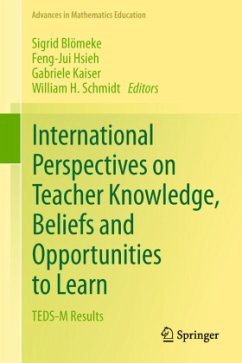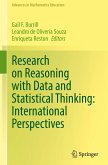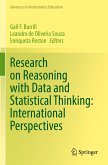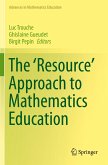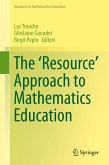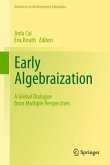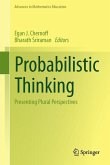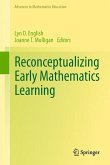International Perspectives on Teacher Knowledge, Beliefs and Opportunities to Learn
TEDS-M Results
Herausgegeben:Blömeke, Sigrid; Hsieh, Feng-Jui; Kaiser, Gabriele; Schmidt, William H
International Perspectives on Teacher Knowledge, Beliefs and Opportunities to Learn
TEDS-M Results
Herausgegeben:Blömeke, Sigrid; Hsieh, Feng-Jui; Kaiser, Gabriele; Schmidt, William H
- Gebundenes Buch
- Merkliste
- Auf die Merkliste
- Bewerten Bewerten
- Teilen
- Produkt teilen
- Produkterinnerung
- Produkterinnerung
This book offers results from the comparative "Teacher Education and Development Study - Learning to Teach Mathematics (TEDS-M)". Carried out under the auspices of the International Association for the Evaluation of Educational Achievement (IEA), more than 23,000 mathematics teachers at the primary and lower secondary levels from 16 countries were tested at the end of the teacher education on their mathematics and mathematics pedagogical content knowledge as well as surveyed on their beliefs and their opportunities to learn. In addition, representative samples of teacher educators and training…mehr
Andere Kunden interessierten sich auch für
![Research on Reasoning with Data and Statistical Thinking: International Perspectives Research on Reasoning with Data and Statistical Thinking: International Perspectives]() Research on Reasoning with Data and Statistical Thinking: International Perspectives123,99 €
Research on Reasoning with Data and Statistical Thinking: International Perspectives123,99 €![Research on Reasoning with Data and Statistical Thinking: International Perspectives Research on Reasoning with Data and Statistical Thinking: International Perspectives]() Research on Reasoning with Data and Statistical Thinking: International Perspectives123,99 €
Research on Reasoning with Data and Statistical Thinking: International Perspectives123,99 €![The 'Resource' Approach to Mathematics Education The 'Resource' Approach to Mathematics Education]() The 'Resource' Approach to Mathematics Education116,99 €
The 'Resource' Approach to Mathematics Education116,99 €![The 'Resource' Approach to Mathematics Education The 'Resource' Approach to Mathematics Education]() The 'Resource' Approach to Mathematics Education117,99 €
The 'Resource' Approach to Mathematics Education117,99 €![Early Algebraization Early Algebraization]() Early Algebraization77,99 €
Early Algebraization77,99 €![Probabilistic Thinking Probabilistic Thinking]() Probabilistic Thinking194,99 €
Probabilistic Thinking194,99 €![Reconceptualizing Early Mathematics Learning Reconceptualizing Early Mathematics Learning]() Reconceptualizing Early Mathematics Learning77,99 €
Reconceptualizing Early Mathematics Learning77,99 €-
-
-
This book offers results from the comparative "Teacher Education and Development Study - Learning to Teach Mathematics (TEDS-M)". Carried out under the auspices of the International Association for the Evaluation of Educational Achievement (IEA), more than 23,000 mathematics teachers at the primary and lower secondary levels from 16 countries were tested at the end of the teacher education on their mathematics and mathematics pedagogical content knowledge as well as surveyed on their beliefs and their opportunities to learn. In addition, representative samples of teacher educators and training institutions were surveyed. TEDS-M analyses in particular the relationship between teacher education policies, practices and outcomes.
Produktdetails
- Produktdetails
- Advances in Mathematics Education
- Verlag: Springer / Springer Netherlands
- Artikelnr. des Verlages: 978-94-007-6436-1
- 2014
- Seitenzahl: 604
- Erscheinungstermin: 23. September 2013
- Englisch
- Abmessung: 241mm x 160mm x 37mm
- Gewicht: 1087g
- ISBN-13: 9789400764361
- ISBN-10: 9400764367
- Artikelnr.: 37071205
- Herstellerkennzeichnung Die Herstellerinformationen sind derzeit nicht verfügbar.
- Advances in Mathematics Education
- Verlag: Springer / Springer Netherlands
- Artikelnr. des Verlages: 978-94-007-6436-1
- 2014
- Seitenzahl: 604
- Erscheinungstermin: 23. September 2013
- Englisch
- Abmessung: 241mm x 160mm x 37mm
- Gewicht: 1087g
- ISBN-13: 9789400764361
- ISBN-10: 9400764367
- Artikelnr.: 37071205
- Herstellerkennzeichnung Die Herstellerinformationen sind derzeit nicht verfügbar.
Sigrid Blömeke ist Professorin für Systematische Didaktik und Unterrichtsforschung an der Humboldt-Universität zu Berlin und Projektleiterin von TEDS-M in Deutschland. Als empirische Unterrichtsforscherin ist sie spezialisiert auf die Messung der professionellen Kompetenzen von Lehrerkräften im internationalen Vergleich und die Untersuchung des Zusammenhangs von Lehrerkompetenzen und Unterrichtshandeln.
1. Introduction: State of research, framework and design of TEDS-M: S. Blömeke, F.-J. Hsieh, G. Kaiser & W. H. Schmidt.- 2. Teacher knowledge at the end of teacher education: International perspectives.- 2.1 Teacher education effectiveness: Quality and equity of future primary teachers' mathematics content and mathematics pedagogical content knowledge: S. Blömeke, U. Suhl & G. Kaiser.- 2.2 Teacher education effectiveness: Quality and equity of future lower secondary teachers' mathematics content and mathematics pedagogical content knowledge: W. H. Schmidt et al.- 2.3 Teacher education effectiveness: Quality and equity of future primary and future lower secondary teachers' general pedagogical knowledge: J. König, S. Blömeke, L. Paine, W. H. Schmidt & F.-J. Hsieh.- 2.4 In-depth analyses of different countries' responses to MCK and MPCK items: Why did Taiwan excel? A view on the difference within and between East and West: F.-J. Hsieh et al.- 3. Teacher beliefs at the end of teacher education: International perspectives.- 3.1 The cultural notion of teacher education: Future primary teachers' beliefs on the nature of mathematics: A. Felbrich, G. Kaiser & Ch. Schmotz.- 3.2 The cultural notion of teacher education: Future lower secondary teachers' beliefs on the nature of mathematics, the learning of mathematics and mathematics achievement: S.-J. Tang & F.-J. Hsieh.- 3.3 The cultural notion of teacher education: Comparison of lower secondary future teachers' and teacher educators' beliefs: T.-Y. Wang, F.-J. Hsieh, T.-T. Yiu.- 4. Relationship of teacher knowledge and beliefs: International perspectives.- 4.1 On the relationship of future primary and lower secondary teachers' knowledge and beliefs: W. H. Schmidt et al.- 4.2 Profiles of lower secondary teachers' knowledge and beliefs: A latent class analysis: S. Blömeke & U. Suhl.- 4.3 On the relationship of tested knowledge and self-reported perception of preparedness forteaching: A fuzzy field: S. Blömeke.- 5. Opportunities to learn in teacher education: International perspectives.- 5.1 Homogeneity or heterogeneity? Profiles of opportunities to learn in primary teacher education: S. Blömeke & G. Kaiser.- 5.2 Homogeneity or heterogeneity? Profiles of opportunities to learn in lower secondary teacher education: W. H. Schmidt et al.- 6 Effects of OTL on teacher knowledge and beliefs: International perspectives.- 6.1 What matters in primary teacher education? A comparison of background, selectivity and OTL effects on future teachers' mathematics content and pedagogical content knowledge: S. Blömeke, U. Suhl, G. Kaiser & Döhrmann.- 6.2 What matters in lower secondary teacher education? A comparison of background, selectivity and OTL effects on future teachers' content knowledge: W. H. Schmidt et al.- 6.3 Does school experience matter for future teachers' general pedagogical knowledge? J. König & S. Blömeke.- 7. Country studies.- 7.1 MCK and MPCK of primary and lower secondary teachers at the end of teacher education in Taiwan: Hot topics and pressing issues.- 7.2 MCK and MPCK of primary and lower secondary teachers at the end of teacher education in the USA: Hot topics and pressing issues: W. H. Schmidt et al.- 7.3 MCK and MPCK of primary and lower secondary teachers at the end of teacher educa-tion in Germany: Hot topics and pressing issues: G. Kaiser et al.- 7.4 MCK and MPCK of primary and lower secondary teachers at the end of teacher educa-tion in Singapore: Hot topics and pressing issues: K. Wong et al.- 8. Methodological reflections on the TEDS-M instruments and the nature of teacher knowledge.- 8.1 The conceptualization of MCK and MPCK in TEDS-M: Döhrmann, M., Kaiser, G. & Blömeke, S.- 8.2 Diagnosing teacher knowledge by applying multidimensional item response theory and multi-group models: S. Blömeke, R. Houang & U. Suhl.- 8.3 The conceptualization of indicators for mathematics teachereducation: Hsieh, F.-J., Law, C.-K., Shy, H.-Y., Wang, T.-Y., Hsieh, C.-J., Tang, S.-J.- 9. Conclusions: What we have learned and future challenges.
1. Introduction: State of research, framework and design of TEDS-M: S. Blömeke, F.-J. Hsieh, G. Kaiser & W. H. Schmidt.- 2. Teacher knowledge at the end of teacher education: International perspectives.- 2.1 Teacher education effectiveness: Quality and equity of future primary teachers' mathematics content and mathematics pedagogical content knowledge: S. Blömeke, U. Suhl & G. Kaiser.- 2.2 Teacher education effectiveness: Quality and equity of future lower secondary teachers' mathematics content and mathematics pedagogical content knowledge: W. H. Schmidt et al.- 2.3 Teacher education effectiveness: Quality and equity of future primary and future lower secondary teachers' general pedagogical knowledge: J. König, S. Blömeke, L. Paine, W. H. Schmidt & F.-J. Hsieh.- 2.4 In-depth analyses of different countries' responses to MCK and MPCK items: Why did Taiwan excel? A view on the difference within and between East and West: F.-J. Hsieh et al.- 3. Teacher beliefs at the end of teacher education: International perspectives.- 3.1 The cultural notion of teacher education: Future primary teachers' beliefs on the nature of mathematics: A. Felbrich, G. Kaiser & Ch. Schmotz.- 3.2 The cultural notion of teacher education: Future lower secondary teachers' beliefs on the nature of mathematics, the learning of mathematics and mathematics achievement: S.-J. Tang & F.-J. Hsieh.- 3.3 The cultural notion of teacher education: Comparison of lower secondary future teachers' and teacher educators' beliefs: T.-Y. Wang, F.-J. Hsieh, T.-T. Yiu.- 4. Relationship of teacher knowledge and beliefs: International perspectives.- 4.1 On the relationship of future primary and lower secondary teachers' knowledge and beliefs: W. H. Schmidt et al.- 4.2 Profiles of lower secondary teachers' knowledge and beliefs: A latent class analysis: S. Blömeke & U. Suhl.- 4.3 On the relationship of tested knowledge and self-reported perception of preparedness forteaching: A fuzzy field: S. Blömeke.- 5. Opportunities to learn in teacher education: International perspectives.- 5.1 Homogeneity or heterogeneity? Profiles of opportunities to learn in primary teacher education: S. Blömeke & G. Kaiser.- 5.2 Homogeneity or heterogeneity? Profiles of opportunities to learn in lower secondary teacher education: W. H. Schmidt et al.- 6 Effects of OTL on teacher knowledge and beliefs: International perspectives.- 6.1 What matters in primary teacher education? A comparison of background, selectivity and OTL effects on future teachers' mathematics content and pedagogical content knowledge: S. Blömeke, U. Suhl, G. Kaiser & Döhrmann.- 6.2 What matters in lower secondary teacher education? A comparison of background, selectivity and OTL effects on future teachers' content knowledge: W. H. Schmidt et al.- 6.3 Does school experience matter for future teachers' general pedagogical knowledge? J. König & S. Blömeke.- 7. Country studies.- 7.1 MCK and MPCK of primary and lower secondary teachers at the end of teacher education in Taiwan: Hot topics and pressing issues.- 7.2 MCK and MPCK of primary and lower secondary teachers at the end of teacher education in the USA: Hot topics and pressing issues: W. H. Schmidt et al.- 7.3 MCK and MPCK of primary and lower secondary teachers at the end of teacher educa-tion in Germany: Hot topics and pressing issues: G. Kaiser et al.- 7.4 MCK and MPCK of primary and lower secondary teachers at the end of teacher educa-tion in Singapore: Hot topics and pressing issues: K. Wong et al.- 8. Methodological reflections on the TEDS-M instruments and the nature of teacher knowledge.- 8.1 The conceptualization of MCK and MPCK in TEDS-M: Döhrmann, M., Kaiser, G. & Blömeke, S.- 8.2 Diagnosing teacher knowledge by applying multidimensional item response theory and multi-group models: S. Blömeke, R. Houang & U. Suhl.- 8.3 The conceptualization of indicators for mathematics teachereducation: Hsieh, F.-J., Law, C.-K., Shy, H.-Y., Wang, T.-Y., Hsieh, C.-J., Tang, S.-J.- 9. Conclusions: What we have learned and future challenges.

